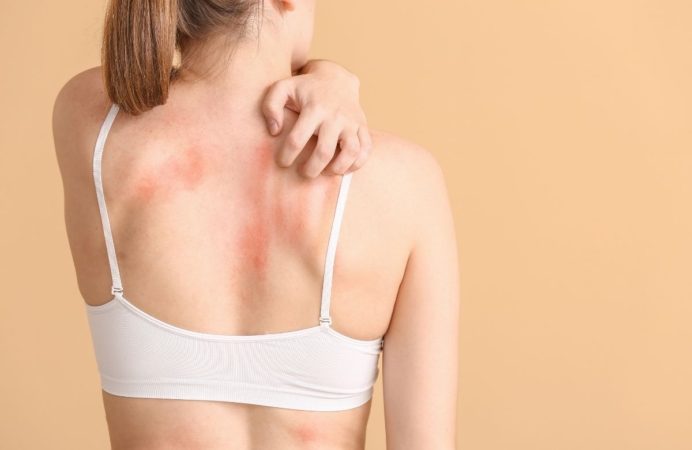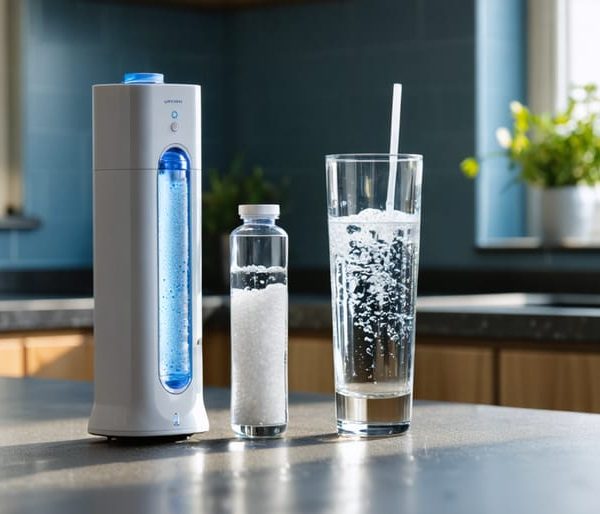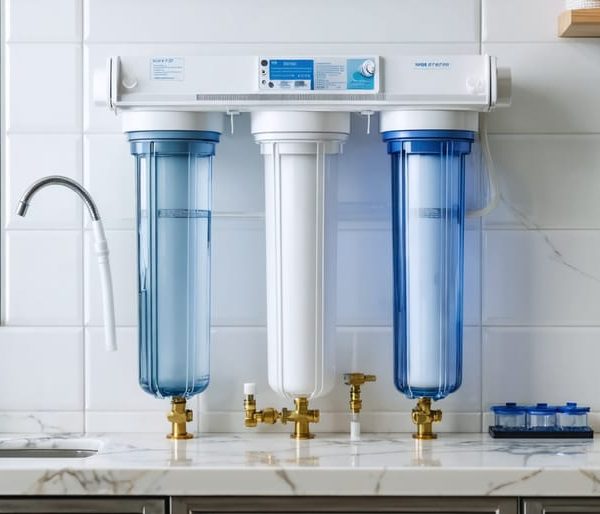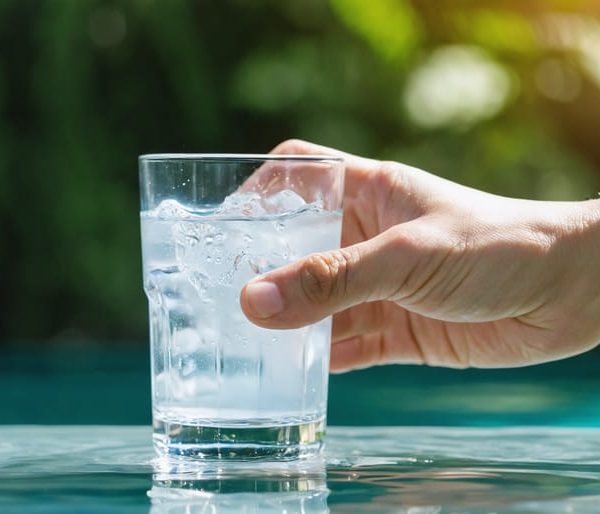Specific contaminants in well water such as arsenic, bacteria, chlorine, chromium 6, pesticides, and hard water minerals such as calcium and magnesium are common causes of itchy skin. However, many other things can cause skin problems, acne breakouts, or dry skin. This could be allergies to perfumes, shower gels, soaps, and laundry detergent.
Hard water can cause itchy skin, but because there are other likely causes of sensitive skin, you have to run a diagnosis at the clinic. It can turn out to be something unrelated to your tap water supply.

However, if your doctor cannot pinpoint the cause of your skin condition, the chances are high that the problem is from your well water. In that case, we recommend you test your water to know if it contains harmful contaminants that can mess with your healthy skin cells.
Contaminants in Your Water That Can Make You Itch
Mineral Deposits
Certain mineral ions such as calcium and magnesium can dissolve in your well water to cause water hardness and make you itch. Magnesium is an essential nutrient that benefits our immune system. On the other hand, calcium is good for strong bones and healthy teeth.
While their benefits to the body are not debatable, high concentrations of these hardness minerals are not supposed to be in your well water. Bathing water rich in these minerals deposits will mess with the original balance of your natural oils.
Households residing in regions where hard water is prevalent are more susceptible to itchy skin conditions. This is because they bathe with hard water daily. This means long-term exposure to these dissolved minerals for an extended period.
Bathing with hard water, which is heavily contaminated with the minerals mentioned above, will leave deposits on your skin surface. These deposits will result in adverse effects such as red skin, itchiness, flakiness, and rashes. In addition, these minerals alter the oil chemistry of your skin, clog pores, and even hair follicles.
When this happens, it limits your skin’s ability to moisturize its surface, creating a dry and itchy sensation. In fact, hard water will thoroughly wash the shine of your skin. In addition, when calcium settles in water and comes in contact with soaps, it will create a soap residue known as soap scum. This worsens the state of the clogged pores and disrupts the skin barrier.
Arsenic
The effects of arsenic on the skin are similar to or worse than that of hard water minerals. The mildness or harshness of its effect depends on the period of exposure and the quantity of arsenic in the tap water. Bathing with water rich in arsenic for an extended period can result in scaly and rough skin patches. It also heightens the risk of getting skin cancer.
Chlorine
Chlorine is a chemical element added to a well to eliminate bacteria. It’s a standard way of disinfecting drinking water, and local utility companies use it. However, when your water contains excess chlorine, it can be harmful to the body when ingested. Chlorine in water can also trigger serious skin problems and make you itch when you use it for bathing.
Chlorinated water can strip your skin of its natural oils, causing skin dryness. It can also damage your hair.
Pesticides
During irrigation, pesticides sprayed on crops are usually washed off, and this chemical seeps into your well water if it’s nearby. You’re more prone to this contaminant if you have open wounds on your skin. This will be the access point(s) for this contaminant.
Pesticides in water can cause serious skin issues such as flushing, itching, and rashes when such water is ingested or used to bathe. Aside from its effect on the skin, it can also trigger kidney or liver damage.
Bacteria
Untreated well water containing bacteria can trigger health problems such as erythrasma or pediculosis. Bacteria enter your well when there’s a crack in the seal in your well casing. Then, it infects the body through open wounds, just like pesticides. Diabetic people are at an increased risk of getting infected because they have a weaker immune system.
How to Reduce or Eliminate Contaminants in Well Water?
Effective ways to treat your well water include:
Salt-Based Water Softener System
If hard water is the cause of the itchy feeling on your skin, the best way to tackle the problem is by installing a water softener. The water softener produces soft water from hard water through ion exchange. Its resin bed draws out hard water minerals from your water and replaces them with sodium ions during this process.
Once soft water starts flowing into your home, it reduces the itchy feeling triggered by irritation or dryness of the skin. Water softeners also reduce problems such as scummy residue and scales on appliances such as your water heater.
Households using well water should install a water softener because hard water minerals are naturally abundant in the Earth’s crust. Since well water comes from underground, it usually contains high mineral content.
Water Filters
Many well water filtration systems have multiple filtration phases that remove several contaminants from your water. When installed at the point of entry, your home will receive a supply of treated water. Once you start drinking and bathing in filtered water, it will reduce the itchy sensation in your skin.
We recommend carbon filters because they can remove a wide range of contaminants, including those affecting your skin. Some households even combine a water filter with a water softener to ensure they enjoy soft and filtered water.
Reverse Osmosis Systems
These whole-house systems can remove at least 98% of contaminants in your water. This includes arsenic, bacteria, nitrates, pesticides, and viruses. RO units don’t specialize in treating hard water, though they can reduce the mineral content in your water. So you may need to combine this with a water softener.
The drawback of these whole house water systems is that they are expensive and have a slow flow rate. So if you install a reverse osmosis filter at your point of entry, water will flow very slowly into your home.
UV Filtration
You can also get a UV unit to sterilize and eventually kill microbes such as bacteria in your well water. These water systems produce UV rays that alter the DNA of bacteria such as salmonella, e-Coli, etc., preventing them from reproducing in your water. It ensures your bathing or drinking water is free from microbes. This is the recommended solution if microbes cause that itchy sensation on your skin. However, UV units are not effective in removing other contaminants.
Alternative Solutions to Irritated Skin
Dehydrated skin can also cause itchiness. So we recommend moisturizing your skin right after bathing. We also recommend drinking enough water every day to keep your skin supple and hydrated. Use mild soaps and avoid soaps containing additives, perfumes, and other chemicals.



